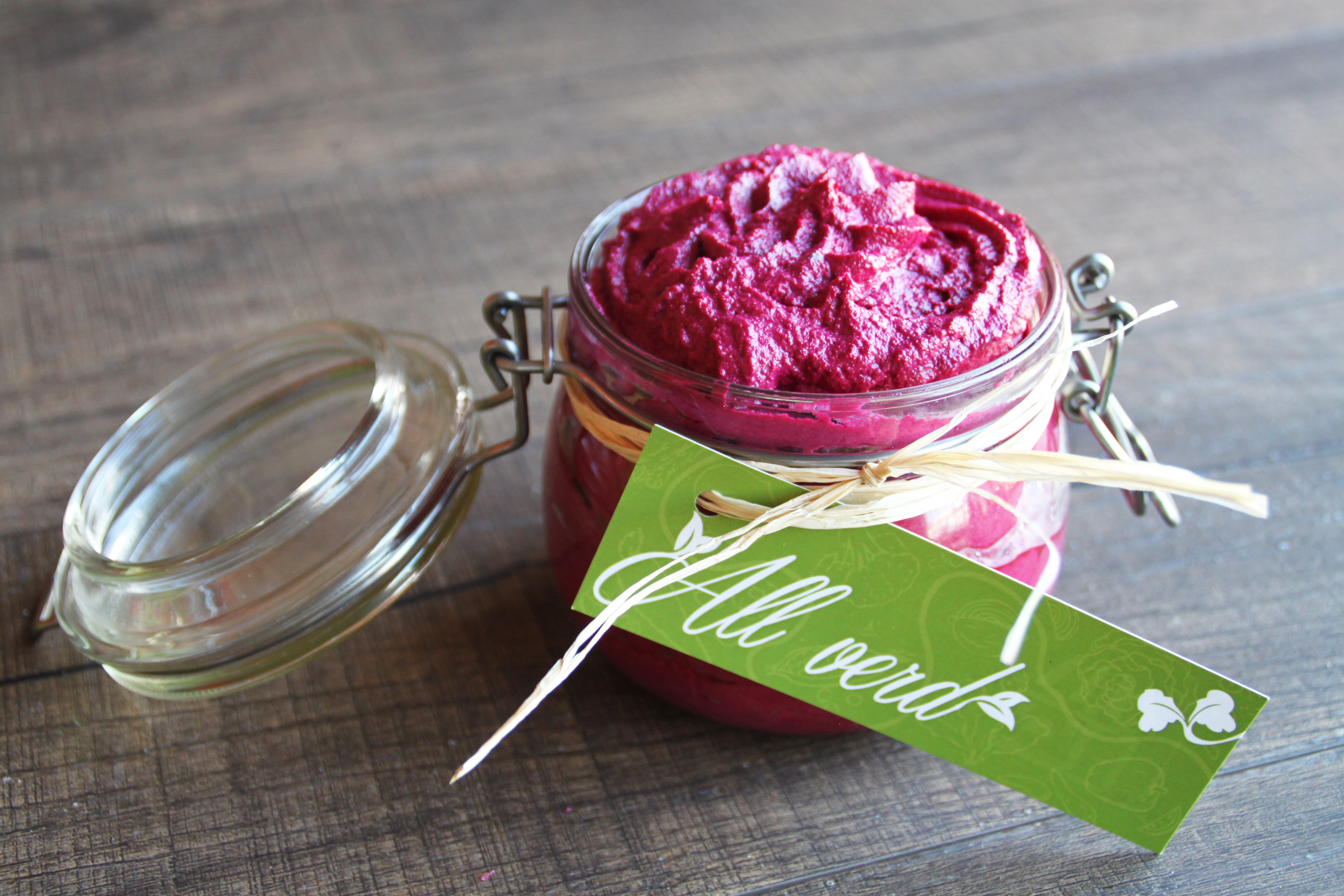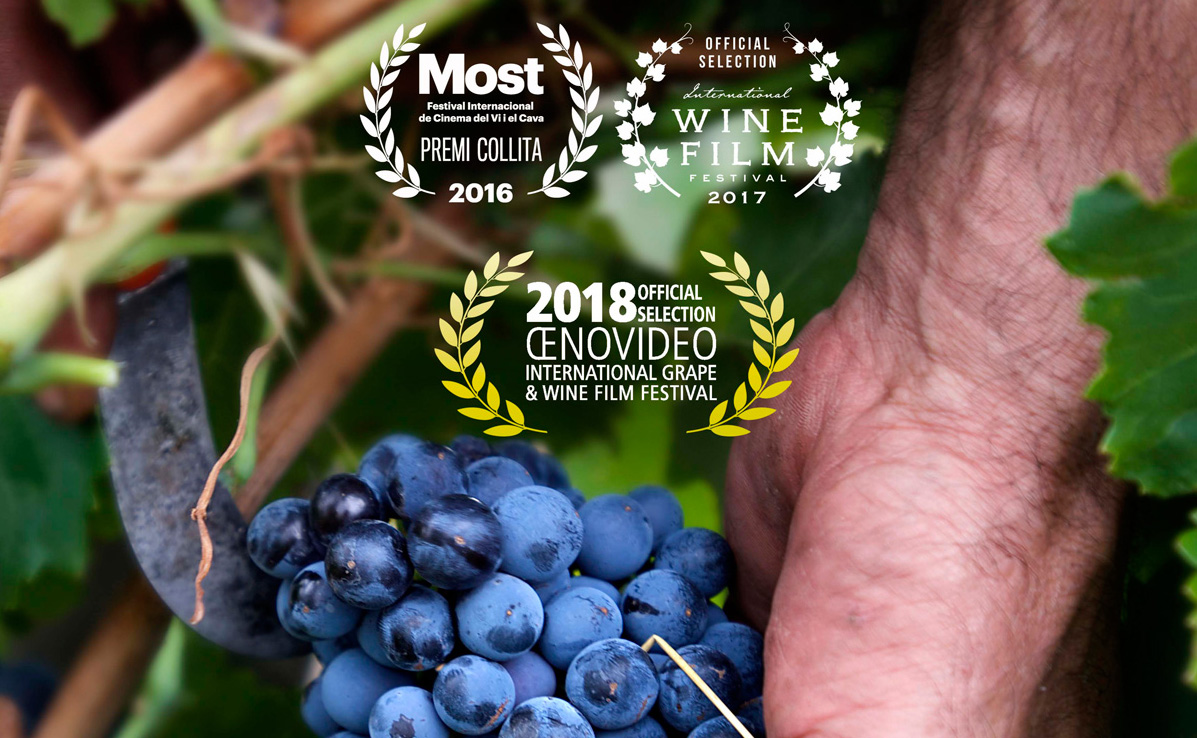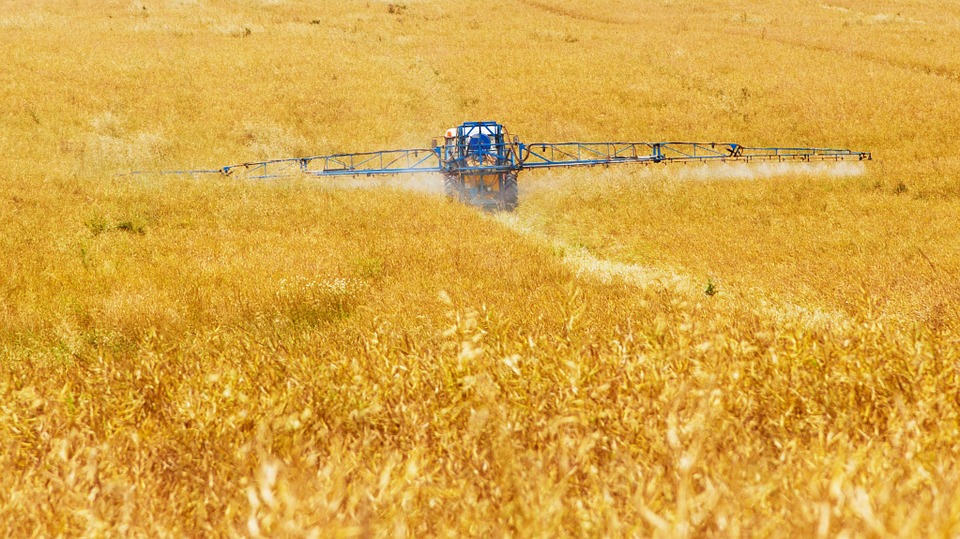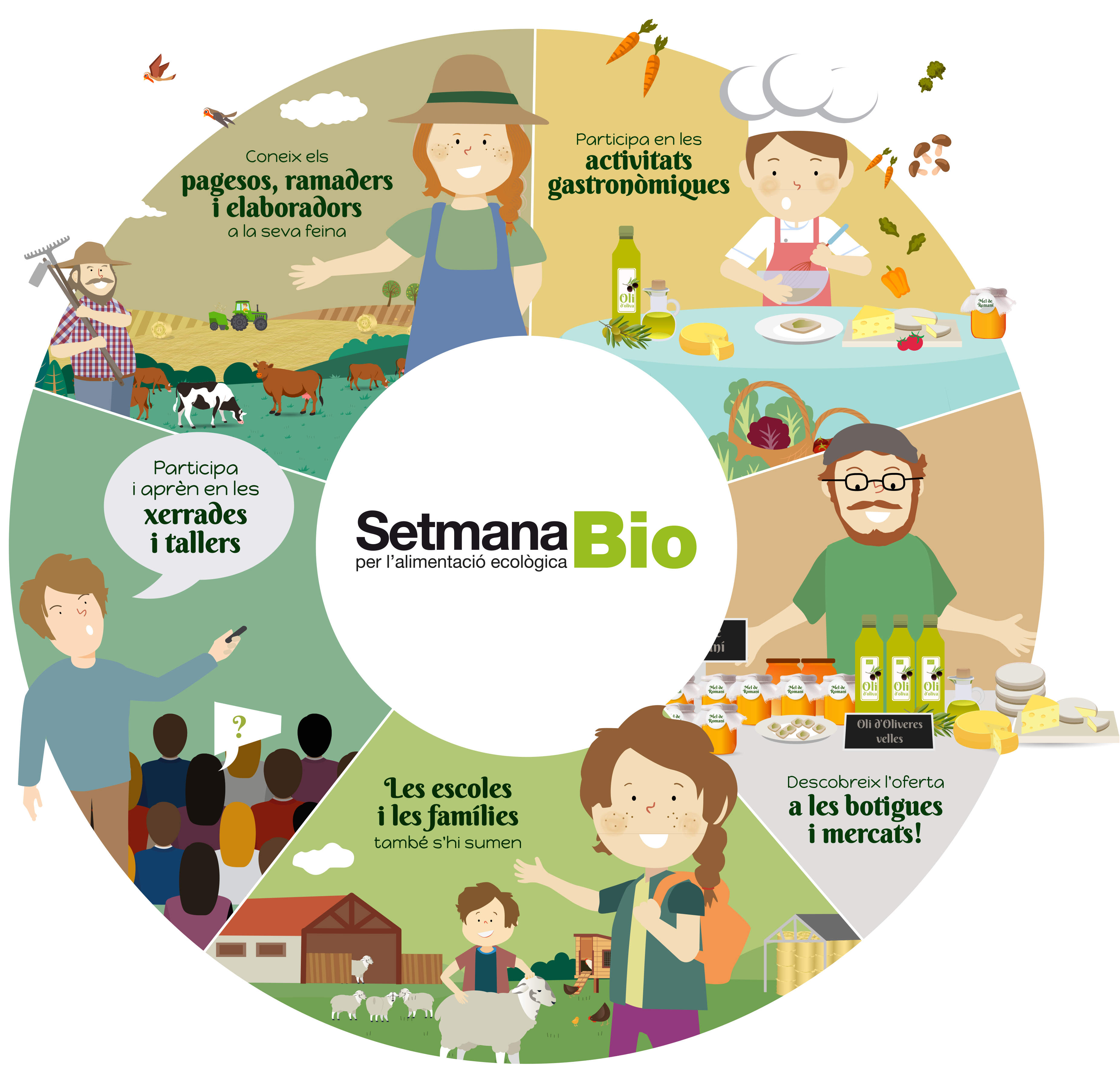Doing it for the pleasure of caring for ourselves and finding a balance, without restrictions or feelings of guilt.
A healthy relationship with food, making the most of seasonal produce and letting creativity into our kitchen, even if it's only for the lunch box we take to work.
We’ll try, using uncomplicated recipes, tastes, aromas and colours. We'll emphasise the importance of colour in our dishes.
Emotions and healthy eating go hand in hand.
Sustainable Food Citizen Week
Video resum de la Setmana Ciutadana de l'Alimentació Sostenible 2021
The activities of the Sustainable Food Citizen Week
Sustainable Food Citizen Week provides an opportunity to understand the relationship between food habits and cross-cutting aspects such as the climate emergency, local economic development, culture, politics, social rights and health. A week dedicated to citizens, in which you will achieve knowledge, reflection and debate about the main issues of the following activities.
Gastronomic heritage
- October 21st - 18.00 HBetevé broadcastingTelevised cooking workshop
- October 22nd - 22.00 H (variable according to betevé programming)Betevé broadcastingDocumentary film season
Documentary on natural wine in Spain. A trip from the north to the south of the country, with the vineyard and wine as the background.
A reflection on natural wine from its producers and opinions from renowned sommeliers.
This activity is part of Betevé's documentary film season, including the films Fermentación espontánea, Taste the waste, Food for change and Il mare piange.So you can combine the documentary with a wine tasting at home, we provide you with a list of wines by order (and time) of appearance.
Minute 01 – Sparkling wine from an ancestral method made in the Alt Empordà. Sparkling wine with unique fermentation.
Minute 05- Red wine from the mountains, made on the north side of the Alpujarra in Granada.
Minute 10 – Mineral and fresh wines made in the Sierra de Gredos (Avila), mainly with Garnacha, also with local white varieties such as Chelva, Albilla Real and Malvar.
Minute 13 – Red wine from the Sierra de l’Albera, in the Alt Empordà, made with Garnacha and Carignan (Lledoner and Samsó).
Minute 16 – White wine with maceration of the skins (orange wine) from Penedès made with Xarello from old vines worked within biodynamic parameters.
Minute 19 – Light red wine made with Sumoll, a native grape of the Penedès. From vineyards surrounded by forests of the Alt Penedès.
Minute 23 - Red wine from Galicia from a heroic viticulture of micro-plots in the Ribera Sacra area.
Minute 27 - White wine from the La Mancha variety and the most planted in the peninsula: Airén, in this case, comes from very old, free standing vineyards.
Minute 31 - Terra Alta red wine, inland Catalonia. From a dry and warm area, with powerful aroma and flavour.
Minute 36 - Wine with Mediterranean expression, made in clay vats in the region of Murcia, from the Tintorera Garnacha grape variety.
Minute 38 - White wine from Montepila grapes from vineyards surrounded by olive trees in Cordoba. - October 29 and 30 from 12.00 to 23.30 H, and October 31 from 12.00 to 22.30 HLa Rambla de Barcelona (between Centre d'Art Santa Mònica and Colom)Market
“Terra i gust” is a gastronomic project that links restaurants with small producers, an initiative from Barcelona City Council and organized by Gastronomia de Proximitat and Slow Food Barcelona, with the support of the Association of Gastronomy and Tourism of Baix Llobregat and l’Hospitalet.
It will be a place for citizens to see the different stakeholders involved in the value chain of local products and sustainability, and to point out the importance of the small artisanal producer, of maintaining traditions and environmentally friendly techniques, highlighting the union with gastronomy.There will be various different spaces:
- Spaces for sustainable gastronomy
- Spaces for beverages, with the participation of the Barcelona Beer Festival, with a selection of craft beers. Natural wines, filtered water, and kombucha will also be served.
- Producers market with seasonal and ecological products.
- There will also be an area for cooking shows, talks and games for kids-
Waste vs Good use
- October 14th - 19.30 HPlaça de Sant JaumeShow
The start off the week will be a chorus, musical, and participative. Having their say will be the real heroes of sustainable food, those involved in the food cycle: the fishermen, drivers, chefs, farmers, ranchers, market vendors. The speech will be intertwined with the large mechanical orchestra of Cabo San Roque, distributed in the form of a sound mural in front of the City Hall, along with the active participation of the public, in a collective musical creation composed especially for the occasion. A show that highlights all the participants behind the food supply network and gives them a voice.
- Scenography and musical composition: Cabo San Roque
- Stage direction and coordination: Edi Pou
- Idea and concept: Virginia Angulo / Martín Garber
- October 16 at 11:00hParc de la BarcelonetaTalk
Presentation of the guide that provides readers with ideas, examples and lines of action for initiating better food-use actions in the city's neighbourhoods, either in the form of food networks, better food use meals or other formats.
Guide authors: Espai Ambiental Cooperativa and Associació Cuchara. Published by Barcelona City Council. - October 16th - 11.30 HParc de la BarcelonetaTalk
Presentation of the Pont Alimentari [Food Bridge] project, promoted by Rezero and the Resources Bank Foundation since 2015, with the aim of reducing food waste in the retail, catering and restaurant food-distribution sector, creating a network for interaction and better food use among donor companies and recipient organisations supporting vulnerable groups.
Urban rurality and biodiversity
- October 16 at 13:40 hJardí dels TarongersTalk
Bees are one of the most important, and unknown, groups of pollinators. The aim of this talk is to showcase the life of bees, and also serve as an opportunity to understand the role that these insects play, together with the hosts, the plants, in the ecological balance of the planet. The reality is that humanity is facing a disturbing problem: the decline of bees. It is a subject that is being talked about more and more, and that we cannot overlook, as the Museum of Natural Sciences. The causes are numerous, and closely linked to the long litany of changes to the environment prompted by human activity. Now is the time for us to understand what we have done wrong and prepare a guide of best practices that can be used to recover the biodiversity that has been lost.
- October 16th - 16.30 HPlaça ReialTalk
The dynamics of this activity involve a mandala. We draw conclusions on how urban agriculture has fared this year, where we have made progress and where not, where we are headed and the importance of agriculture within the city, with the participation of various people connected to urban agriculture and others who will help us to connect with our bodies.
This is an open, participative activity where the audience can contribute their wishes and materials to the mandala. Ritual for closing and opening the year, as it has been a busy one in urban agriculture. - October 16th - 17.30 HJardí dels TarongersRound table
The Metropolitan agricultural belt is the on-site embodiment of the need (exacerbated by climate change and the biodiversity crisis) for healthy, wholesome and sustainable local supplies. It starts in the Metropolitan Area and includes the entire Metropolitan Region: it has a bottom-up structure, based on the view, already accepted by some city councils, that we need to preserve or create an agricultural belt around every municipality. We are therefore talking about a belt of belts.
To make this possible, the two main challenges we face are access to production resources and guaranteed fair prices. And in addition to this demand for “minimum prices for food and maximum prices for land”, there is the vital importance of adopting large-scale healthy, mitigating and regenerative agronomic practices. This means that financial aid for farmers has to involve cross compliance, but also has to be available to everyone, not just the big producers.
Ecological footprint
- October 17th - 13.00 HPlaça del ReiTalk
Talk looking at all the most common stages of the life cycle of our food. From the farm to the table, we’ll be pondering the carbon footprint of agriculture, packaging, logistics, cooking, organic waste etc. The overall goal is to provide information for deciding on food which has a lower impact in terms of greenhouse gas emissions. The session will also stress the contradictions in environmental communication for consumers.
- 17th October 13.30 hPlaça del ReiTalk
What are the impacts of our food system on our planet? How does this affect the peasantry, our territory and the communities of the global south? What role does the food industry play? What can we do as consumers? What is the role and situation of women, who have traditionally fed the world? On all these issues, we offer you an exciting dialogue with Vandana Shiva (Indian climate activist, graduate in physics, philosopher, ecologist, feminist and author of more than twenty books and 300 articles in the world's most prestigious scientific journals) and Esther Vivas ( activist, researcher in social movements and agricultural and food policies, degree in journalism and diploma in higher studies in sociology from the Autonomous University of Barcelona).
- October 17th - 17.30 HPlaça del ReiRound table
The current industrial agri-food system generates a series of environmental conflicts that are manifested through struggles and mobilisations in response to the impact this system has on the environment and society. These conflicts are mainly associated with the defence of environmental conditions or equal access and distribution of natural resources, often occurring in production and transit areas, and ultimately affecting the regions and communities where they happen. They often reveal conflicting interests, different development paradigms, and aspects related to involvement in decision-making.
The aim of this roundtable is to address some of the main current socio-environmental conflicts in Catalonia, arising from the food system, and to understand the causes and impacts both in Catalonia and the Global South, in order to make them visible, encourage dialogue and provide possible solutions or alternatives.
Proximity
- October 17th - 11.30 HParc de la BarcelonetaTalk
Explanation of the Baix Llobregat Agricultural Park as a metropolitan agricultural area that produces food locally for the Barcelona Metropolitan Area. A public-private entity that aims to preserve the farmland and encourage the development of a professional agriculture that ensures the supply of fruits and vegetables to local markets and the viability of farms. During the talk we will discuss projects like the Parc Agrari farmers markets, the Producte Fresc del Parc Agrari brand, and the creation of a “test” area to encourage young people to get involved in farming.
- October 17th - 12.00 HParc de la BarcelonetaTalk
Ramats de Foc is a prescribed-silvopasture project aimed at boosting the contribution of livestock in fire-risk management through pasture in strategic forest areas.
Prescribed silvopasture is the practice of extensive livestock feeding following established a priori guidelines and goals to achieve a type of fire-resistant forest mass and Ramats de Foc is an initiative to promote this work, and help to extend it through our forests and bring it added value.
The project also aims to promote continuity of livestock activity in the region, through its twofold food and landscaping work, and to strengthen the ties between shepherds and local butchers.
By promoting the consumption of livestock animals that manage our forests, the aim is to encourage a change of perception in society so people understand how a certain kind of regional management will enable protection against the big fires that cause the most damage and that initiatives as simple as consuming local livestock are already helping to maintain fire-adapted landscapes.
- October 17th - 12.30 HParc de la BarcelonetaTalk
Alternatives from the global south to the impact of our unsustainable food system: the case of the Mercado Central del AMBA (Buenos Aires metropolitan area).
The activity, which is aimed at all members of the public, is part of the agreement for implementing the “Barcelona menja bé i just” project.
More week
- October 16-22VideoconferenceOnline
In this theoretical-practical online course you will learn about the tools you need for a healthier, more balanced diet, learning to choose seasonal ingredients and use them in simple, quick and tasty recipes. We will explain how you can organise and design your weekly menu so that it is more varied and sustainable. We will help you to consume in a more conscious way, avoiding food waste and unnecessary packaging. You will prepare simple, tasty vegetarian recipes, in order to include more fresh, seasonal vegetables in your diet. A dietician will always be on hand to answer any queries, and you can share your experience with other participants to ensure that the session is more fun and worthwhile.
You will receive information and a recipe every day, by email. Throughout the course, there will be a WhatsApp group for comments and queries.
Activity with admission price (€15). - October 16-22, all dayVideoconferenceOnline
Do you know everything you can do to avoid food waste?
From 16 to 22 October, put yourself to the test! Participation through Nutrició Sense Fronteres Instagram - October 16-24 - Every day at 9.00 HFace to face and onlineWorkshop
Bio Week for Organic Food is an event featuring a whole host of activities around Catalonia, with the common goal of promoting and introducing organic produce and food to the public. The activities are organised by producers, processors and transformers, associations, shops, restaurants and schools working on subjects relating to organic agri-food production. See all the activities on the www.setmanabio.cat.























